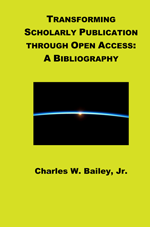Arthur Sale has self-archived "Recent Developments in Open Access" in UTAS ePrints.
Here's an excerpt:
Open Access to the world's research literature has been an obvious development since the emergence of the Internet. To everyone, it appears clear that the costs of disseminating research could drop dramatically. Yet, progress in achieving it is strangely slow. This paper explores recent developments in open access, including:
- The recent Australian NH&MRC and ARC mandates for open access deposit in university repositories, and how universities are responding to them
- The UK&'s Finch Report, and Lord Krebs&' Committee Report
- Recent USA and German developments
- Gradual growth in open access journals, and the challenge for universities and their libraries of transferring reader-side fees (subscriptions) to author-side fees (publication charges)
- The emergence of submission fees so that highly selective journals need not transfer all the costs of rejections onto successful articles
- Fake conferences and journals which exist only to extract attendance or publication fees
- Newer publishing models
- The recent emergence of a third route to open access based on social networking.
| Digital Scholarship | Digital Scholarship Publications Overview | Sitemap |


